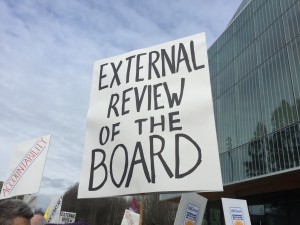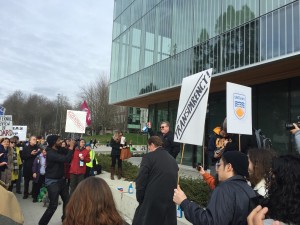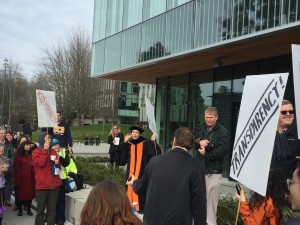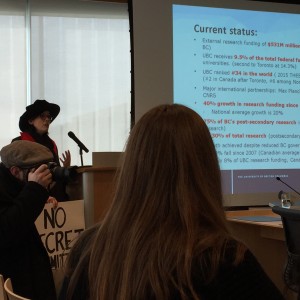Emma Partridge, Ubyssey, November 20, 2015–A much anticipated documentary by the fifth estate has made some startling discoveries that ultimately cast an unflattering spotlight on how UBC handles sexual assault and the university’s lack of an overarching sexual assault policy.
According to CBC, Dmitry Mordvinov, who was working towards his PhD in history, was accused of multiple sexual offences that were committed two years ago. However, Mordvinov was only expelled from the university last week.
UBC spokesperson Susan Danard issued an emailed statement Friday evening responding to the story.
“It is important to understand that BC privacy law prevents us from disclosing information about or responding to specific cases mentioned in the media. What we can say is we continuously strive to improve our collective response to sexual violence through education. We can do better and we will do better,” read part of the statement.
Several women came forward to the fifth estate to tell stories of assaults committed by Mordvinov. One preferred to remain anonymous, but another, Caitlin Cunningham, went on record. She told the CBC that after reporting her attack to the university, UBC encouraged mediation between herself and Mordvinov.
According to the CBC’s reporting, Monica Kay, director of conflict management, perpetuated a sense that the survivors should keep their experiences to themselves. At this time, Kay has not responded to requests for comment.
When The Ubyssey spoke with Clark Lundeen, assistant principal of Green College — the residence in which Mordvinov was staying while studying for his PhD — he said that reports of sexual assaults would be taken very seriously. Based on the findings of an investigation, the survivor would be referred to on-campus resources for support.
“Confirming is a difficult thing. If we receive a complaint from somebody at the college who alleged that they’re a survivor of sexual assault by somebody, then we take it very seriously and make sure that their safety will be made a priority and that includes … not sharing information that might compromise their privacy,” said Lundeen in that interview.
Although Lundeen would not reveal anything that could have potentially comprised the privacy of the survivor and the alleged assault victim, he could confirm that a report of sexual assault had been filed at the college within the last two years. According to Lundeen, the response by Green College “would be very similar to how it would be handled in any other residence managed by Student Housing and Hospitality Services.”
According to Janice Robinson, director of Residence Life and Administration in Student Housing and Hospitality Services (SHHS), should a survivor disclose their experience the response would be that the residence advisor offers peer support and focuses on getting the survivor the resources and help they need.
“At that point, a residence advisor would also share with the Residence Life manager that a resident has disclosed,” said Robinson. “From there, the Residence Life manager would coach [the] residence advisor on how to be the most supportive that they could, and that would include making sure that the student knows about resources on campus and off campus.”
When asked to address the issues raised by the fifth estate documentary, SHHS, Green College and Piper all insist that UBC takes the issue of sexual assault seriously. However, if CBC is correct in their findings, it took the university almost a year to expel the graduate student who they were officially aware to have assaulted a woman in the spring of 2014.
All of this is ultimately complicated by the fact that UBC does not have a single overarching policy on what to do in the event of a sexual assault. When asked about the progress of such a policy in Senate, both Piper and interim Provost Angela Redish said the question ought to be directed to the VP students, Louise Cowin, who was not present.
According to Ashley Bentley of the AMS Sexual Assault Support Centre (SASC), it is problematic that UBC lacks such a policy to deal with assaults and instead relies more on Policy 3 — dealing with harassment and discrimination in general.
“My experiences from talking to clients, to survivors of violence and to members of this community is that the lack of a policy by UBC makes it seem like they aren’t supporting survivors — that they’re not caring,” said Bentley. “It’s not necessarily to say that a policy solves everything, but what I do think it does is it has clear set guidelines and processes in place which at least make survivors feel like they have options.”
Many other universities have an overarching policy on sexual assault, such as Queen’s and University of Toronto to name a few. According to Bentley, UBC is “quite behind, honestly.”
Read More: Ubyssey


 Follow
Follow



Letter to @UBC President: time to lay down the mace #ubc100 #ubcnews #ubc #bced #highered #caut
Open Letter to UBC President Piper:
Time to Lay Down the Mace
It has been an emotional year for the University of British Columbia. As budgets moved from Central, the Truth and Reconciliation Commission of Canada launched Honouring the Truth, Reconciling for the Future. The residential university and college take on new meaning. As we launched the celebration of our Centennial at UBC 100, our President resigned under a cloak of secrecy. As we began to party, we launched an investigation to discover the lengths to which a Chair of the Board of Governors and administrators might go to suppress academic freedom. Now, as we march to Convocation, students and alumni launch evidence that UBC is failing to properly respond to sexual assaults on campus.
In the meantime, terrorists and terror struck Sharm el-Sheikh, Beirut and Paris while the dogs of war howl for bombers and drones to command from the skies above. Increasingly larger regions of the world live in a state of emergency.
It’s difficult to know where this University now stands or what it stands for.
To take a stand symbolic of peace and reconciliation, please lay down the mace for ceremonies and Convocation. Please put away the coat of arms and lay down the mace. If not for good, then how about for peace?
It is time to retire this symbol of aggression, authority and war. It’s time to march to graduation ceremonies this week with open and empty hands as symbolic of peace and reconciliation of controversies and roles of the President’s Office.
UBC’s mace is a relic but a relic of what? The mace is symbolic speech but what is it saying about us now?
From ancient times, this club, this weapon of assault and offence, the mace was gradually adorned until the late twelfth century when it doubled as a symbol of civil office. Queen Elizabeth I granted her royal mace to Oxford in 1589. From military and civil power derives academic authority. The rest is history and it is not all good.
Dr. Thomas Lemieux, School of Economics, with UBC’s Mace at the May 2015 Convocation.
It is time to retire the macebearer, whose importance is inflated every year by the image’s presence on UBC’s graduation pages leading to Convocation. In pragmatic terms, if the mace falls into the hands of the wrong macebearer or manager at this point, someone’s liable to get clocked with it.
Is UBC’s mace still a respectable appendage to Convocation?
Remember, since that fateful November day in 1997, just five months into your Presidency, when student activists put their bodies and minds on the line at the APEC protest, Tuum Est adorns both the can of mace sprayed in their eyes and the ceremonial mace that the President’s Office is eager to carry across campus every November and May. That’s “too messed,” as the students say.
Is it not time to retire both?
Comments Off on Letter to @UBC President: time to lay down the mace #ubc100 #ubcnews #ubc #bced #highered #caut
Posted in Academic freedom, Accountability, Administration, BC Education, Campus Life, Commentary, Critical University Studies, Faculty, Free speech, Governance, Government, Maces, Regalia, Scandals, Students
Tagged Academic freedom, Administration, Ethics, Faculty, Free speech, Governance, Government, Students, University presidents